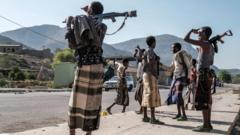Ethiopia's main opposition party, the Tigray People's Liberation Front (TPLF), has issued a grave warning regarding a recent ban on its activities, which it claims could significantly endanger the peace agreement established in 2022. This agreement marked the conclusion of a brutal two-year conflict in the Tigray region. The TPLF has called for the African Union's involvement to mediate after the country's electoral agency revoked its legal status as an official party.
Following a decision made on Wednesday, the TPLF was banned due to its failure to conduct a general assembly, a requirement exacerbated by ongoing political turmoil in Tigray. This ban comes in the wake of rising tensions as Ethiopia gears up for nationwide elections scheduled for next June.
The TPLF has a historically significant role in Ethiopian politics, having been instrumental in the overthrow of the previous regime in 1991 and maintaining governmental control until 2019, when Prime Minister Abiy Ahmed ascended to power and established a new political party, a move the TPLF rejected. Their disputes escalated into a civil war that resulted in countless deaths and displaced millions.
In the aftermath of the peace deal, the TPLF has been managing the interim administration for Tigray, set up as part of the Pretoria peace agreement. However, internal conflicts within the party over leadership have stymied the holding of necessary elections. The National Election Board of Ethiopia’s directive to deregister the TPLF has led the party to protest this action, advocating for intervention from the African Union to halt the enforcement of the ban.
In correspondence to the AU, the TPLF highlighted that the ban undermines their rights as reinstated by the Pretoria Agreement and poses a significant risk to the peace process's stability. The integrity of the agreement relies on both parties recognizing each other's legitimacy and resolving issues through dialogue.
TPLF deputy chairman Ammanuel Assefa expressed concern that the electoral board's decision could have detrimental effects on the Pretoria agreement and warned it could rekindle conflict. He emphasized, "This isn't just about TPLF, but also about undermining what people have sacrificed."
Delays in executing the terms of the peace agreement, particularly concerning the resettlement of approximately one million displaced individuals, have sparked fears of renewed violence in Tigray. International voices, including representatives from the US, UK, and the European Union, have urged that there be "no return to violence" amidst increasing tensions in the region.



















